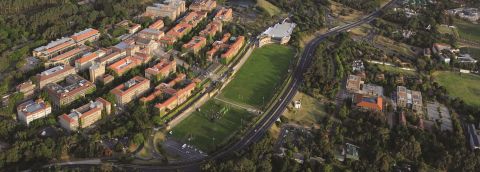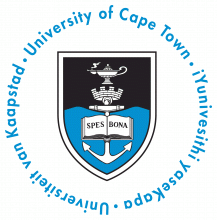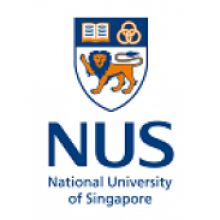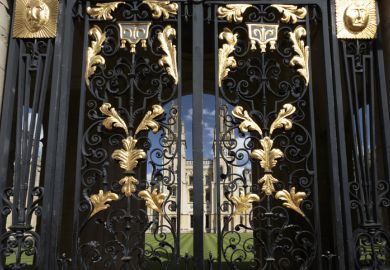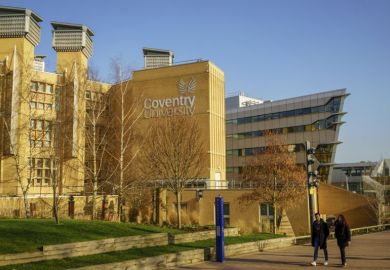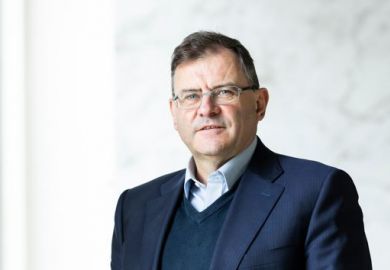When universities are challenged over the high pay levels of their leaders, they often make the point that they are competing in a global market for top talent. And if you want evidence that recruiting university leaders is a borderless endeavour, you do not have to look very far.
Last September, for instance, Tony Chan, a Hong Kong-born and American-trained computational mathematician, took the helm at King Abdullah University of Science and Technology (KAUST) in Saudi Arabia after running the high-flying Hong Kong University of Science and Technology (HKUST) for almost a decade.
Chan took over from French civil engineer Jean-Lou Chameau, a former Caltech president, who, in turn, had succeeded KAUST’s founding president, Shih Choon Fong, a fracture mechanics expert and one-time boss of the National University of Singapore (NUS).
Meanwhile, in May, Deep Saini, an Indian biologist, announced his resignation from the University of Canberra in Australia to lead Dalhousie University in Canada. The following month, Dawn Freshwater, a Nottingham-born mental health researcher who had run the University of Western Australia since 2017, revealed that she was crossing the Tasman Sea to head the University of Auckland.
On the other hand, July saw structural engineer Jin-Guang Teng assume the presidency of Hong Kong Polytechnic University (PolyU), where, apart from a brief stint 30 miles away as vice-president of Shenzhen’s Southern University of Science and Technology, he had worked since 1994. The same month, Nottingham Trent University deputy vice-chancellor Eunice Simmons was named vice-chancellor of the University of Chester, some 75 miles distant.
In June, soil scientist Paul Mapfumo, who had worked at the University of Zimbabwe since 2000, became the institution’s latest vice-chancellor, after acting in the role for almost a year. In the same month, political scientist Nana Poku, a deputy vice-chancellor of the University of KwaZulu-Natal who had been acting vice-chancellor for eight months, was formalised in the leadership role, while Dutch geneticist Cisca Wijmenga was appointed rector magnificus of the University of Groningen, where she had worked since 2007.
Indeed, eight of the nine most recently installed Australian vice-chancellors were recruited from interstate universities or agencies. And a recent Times Higher Education analysis of the leaders of the world’s 400 top institutions has found that fewer than one in five has a background in other countries.
The new-broom university executive, headhunted from the other side of the planet, seems, in reality, to be more the exception than the rule. A more familiar modus operandi is for a university faced with the loss of its chief executive to proclaim that it is searching far and wide for the best conceivable replacement, only to appoint from the institution – or the office – next door.
Of course, universities in some systems genuinely search far and wide for new leaders. An example is Hong Kong, where, notwithstanding Teng’s recent ascension at PolyU, presidents of four of the other seven public universities were brought in directly from the US.
“When we recruit for a president, it’s very much open,” says PolyU’s director of institutional research and planning, Alison Lloyd. “It’s about [finding] the blend of skills needed to take the university to the next level of development. Their appreciation of the cultural nuances of the university is very important, but [so is] a good understanding of how things [in the wider world] work. It’s the marriage of those two things that is important.”
Lloyd says Hong Kong’s location makes cross-fertilisation of university leadership inevitable. “We have a high proportion of faculty members who have been educated overseas and understand Asian culture because of their upbringing. Hong Kong’s position close to China gives us a very good advantage in attracting a lot of high-quality scholars back to this area.”
At the other end of the spectrum lies the Netherlands. It would be hard to find a more international location than Maastricht, the Dutch university city dangling on a sliver of land between Belgium and Germany that gave its name to the European Union’s founding treaty. And the university prides itself on its internationalism: many of its courses are taught in English and 50 per cent of its students and 40 per cent of its academics hail from other countries.
Yet far from seeking foreign leaders, Dutch universities avoid even recruiting from other Dutch institutions. In her 2016 inaugural speech, current Maastricht University rector Rianne Letschert observed that her recruitment from Tilburg University, some 75 miles away, was “breaking many of your traditions…and in the eyes of some even breaking the law.”
Letschert says as few as two of the 40-odd executive board members running the country’s 14 government-funded universities come from overseas. They include Maastricht president Martin Paul, who hails from nearby Germany.
“We tend to appoint mainly Dutch executives, which is not a good thing,” she says. “The Dutch way is not always the best way; I’d prefer to get new input and insight. We have so many international staff in the Netherlands. Why should they not [reach] the executive level? We have seeds that we raise, but they never get to the top.”
Singapore resides somewhere between the Hong Kong and Netherlands examples. While all vice-chancellors of the top-ranking NUS have had Singaporean heritage, crosstown rival Nanyang Technological University (NTU) is currently led by Mumbai-born engineer Subra Suresh, who previously ran Carnegie Mellon University in Pennsylvania. Suresh took over from Swedish biochemist Bertil Andersson, a former rector of Linköping University.
Pookong Kee, a former director of NTU’s Chinese Heritage Centre, says these overseas appointments are “particularly notable” given the “special cultural mission” enshrined in NTU’s predecessor institution, Nanyang University, which was the first university outside China, Taiwan and Hong Kong to teach in Chinese. The NUS, established during Singapore’s colonial period, had always taught in English “because Britain wasn’t willing to allow Chinese language for higher education”.
Recruiting presidents with neither Chinese nor Singaporean heritage is a tacit statement that national heritage is irrelevant when it comes to leadership, says Kee, who is currently chair of Australian studies at Peking University: “The university now has a global mission and appoints the best from the outside world. Whereas the NUS, being national, does have some national considerations.”
The risk for foreign appointments, Kee adds, is that they fall foul of nationalist sentiments. The old Nanyang University, for instance, still has a very active global alumni network, some of whom “might complain about the appointment of non-Singaporeans as president. Whether university appointment committees take that into account, we don’t know. I’m sure official documents would show that they appoint the best, and rightly so, but often universities have their own priorities and considerations,” Kee says.
In some places, nationalism can be trumped by regionalism or even tribalism. Last year, two expatriate vice-chancellors’ attempts to foist Western administrative norms on Papua New Guinean universities ended with both fleeing the country.
Welsh botanist John Warren decamped in August, two years into a leadership stint at the Rabaul-based University of Natural Resources and Environment, after his decision to appoint a pro vice-chancellor on merit rather than tribal allegiance apparently incurred the wrath of the university’s chancellor and led to veiled threats of police action against him.
Three months earlier, Dutch environmental economist Albert Schram exited the country after his work to root out corruption at the Papua New Guinea University of Technology, which had provoked regular attempts to have him dismissed, culminated in his arrest over demonstrably false claims that he had faked his PhD. He fled while on bail.
But in NTU’s case, former president and Singaporean native Su Guaning says its leadership choices reflect skills availability rather than cultural considerations. “When I was looking for my successor, I couldn’t find anybody [in Singapore],” Su told the THE Asia Universities Summit at Khalifa University, Abu Dhabi, last May. “Other than raiding NUS [and] getting senior people there to come over, there were no accessible choices, so we had to look for foreigners.” He was eventually succeeded by Andersson.
Su blames the paucity of domestic options on Singapore’s habit of luring its overseas-based postdoctoral researchers home too quickly with scholarships. This is a “tragedy of success”, he told the summit, because promising Singaporeans were denied the chance to develop their academic skills overseas. “It is not just the scientists and engineers we need: it is also decision makers [and] research and development directors.”
An example is new president Suresh, who spent three years as director of the National Science Foundation in the US. “We have not spent enough time or effort developing such people,” Su said. “It takes time.”

If NTU looked West for its new leader, other institutions are looking East. Chan says that in KAUST’s case, this happened from “day one”, with founding president Shih’s recruitment from Singapore in 2008.
Chan told last year’s World Academic Summit that Saudi Arabia had traditionally been “very Western-oriented”, taking a steer from the US in particular. “It makes sense because petroleum was exported to the US [and] the US had the best universities,” he told the conference, held at the NUS.
“But now the biggest customers are in Asia: China, Korea and so on. Instead of trying to identify a country or a region to copy…you try to learn from the best. Saudi Arabia in general [and] KAUST in particular have to look to the East because…the talents are there.”
“The world is so global,” Chan added, citing his own experience: “I went back to Hong Kong 10 years ago, but now I’ve left. Did I leave because somehow I hated Hong Kong? No, I found a better opportunity. This will happen no matter where you are.”
Peking’s Kee notes that universities often enlist large international recruitment firms to help fill senior appointments. These firms – perhaps headquartered in London or the US – have databases that can be “skewed in certain directions” in terms of nationality. And with university heads often chosen from the ranks of provosts, deans and other senior administrators, representation patterns at these levels are likely to be replicated in the leadership.
Meanwhile, Australian educationalist Kwong Lee Dow, a former University of Melbourne vice-chancellor, notes that globetrotting university leaders are themselves likely to be skewed towards certain fields. Scholars in medicine, health and the sciences, for instance, are extremely mobile; universities are less likely to find themselves being led by foreigners with backgrounds in more locally focused fields, such as law.
In the case of Hong Kong, Lee Dow notes that leadership patterns have fluctuated. The older University of Hong Kong and Chinese University of Hong Kong were gravitating towards local presidents before the 1997 handover of control of the territory to China. Newer institutions such as PolyU, HKUST and the City University of Hong Kong – all of which were designated as universities in the 1990s – had more Chinese people in “key positions” from the outset, Lee Dow says. “Often [they were] Chinese who had had extended periods of study and staff membership in a Western, often English, university.”
While Singapore has arguably been less open to foreign university leaders than Hong Kong, both systems contrast starkly with the big nations of eastern Asia. “You’d be really hard pressed to find [foreign] people in prominent Chinese universities occupying positions of substantial authority and influence,” Lee Dow says. “And you certainly don’t get that happening in the Japanese universities.”
Lee Dow, who also served as vice-chancellor of what was then the University of Ballarat in regional Victoria, is one of very few Australians of Chinese heritage who have reached the top level of Australian academic administration. “Every now and then you get someone from an Asian country bobbing up in a position like deputy vice-chancellor international or DVC research. But, really, for the make-up of Australia now, we’re probably not as diverse in our institutional leadership as we should be.”
That will change over the next five to 10 years, Lee Dow hopes. “Just as now there’s much more awareness about having women in leadership positions, I think a time will come [when the same is true regarding different ethnicities],” he says – particularly in large, multi-institutional cities such as Melbourne and Sydney.
While Asian Australians will not affect university leadership materially, Lee Dow says, they will better reflect the composition of contemporary Australian society and will change "people’s perceptions about staffing and appointments further down the line. The people that come into those roles will probably have had a fair amount of international experience in both the East and West. You’ll get people of Chinese background who are born and educated in Australia, get some experience in an Eastern country and come back to take up a leadership role in Australia.”

If a university leader from an ethnic minority can inspire, the symbolism of a leader from a disadvantaged majority can be even more important. Black South African mathematician Mamokgethi Phakeng, who became vice-chancellor of the University of Cape Town last year amid harrowing conflicts over fees and the legacy of imperialism, says it is important to make the distinction between “peace time and crisis time”.
“Every entity has to be clear when it recruits a leader: what’s the context?” Phakeng says. “The context of leadership is not just whether it’s a hospital or an education institution or whatever. It’s social, political, economic – and you’ve got to appoint a leader suitable for [the] time. In the kind of crisis that we have in South Africa now, it may be very challenging to have someone from outside who doesn’t understand the social [and] political issues of the context, the debate, the contestations in higher education and on the ground. It’s not that the outsider will not be skilled. An excellent leader in peacetime [who] fails in crisis time is not necessarily a bad leader. It’s that their leadership is not working for crisis times.”
This doesn’t mean that South African universities should shy away from internationalisation, Phakeng insists. “You still want to recruit talent from all over the world, everywhere you can find it.” But there are limits in a country struggling with questions about identity and redressing the past: “How do students see themselves in the university? Do students recognise themselves in who teaches them, what they teach, how they teach? If the majority is from outside the country, [such issues] might be difficult [to address].”
Phakeng’s predecessor at Cape Town, Johannesburg-born doctor and Rhodes scholar Max Price, agrees that “context is everything” and universities need different kinds of leadership at different times. He believes that he “wouldn’t and shouldn’t” have been awarded the top job eight years prior to his appointment in 2008. At that point, the university needed someone to “calm the place down” after the previous vice-chancellor had “turned the place upside down”.
“I would have been wrong. I am somebody who would want to pursue a vision and do something different. I happened to come in when the university was ready for something else, and that was right for me.”
Western Australia’s Freshwater says external appointments bring a particular perspective. “When I came to Australia I had no idea whose toes I was treading on,” she says. “Some people have very long toes. But I could see what needed to be done. The largest transformation the university has gone through in its 110-year history took place in the last six years. That has been both a blessing and very painful.”
Freshwater acknowledges that her approach has not always been well received. “There are people who [think] somebody like me coming in from the outside has ripped the heart out of their university. [There is an] assumption that it’s difficult for an internal candidate to make change [but] coming from the outside is also difficult.”
Maastricht’s Letschert says context can also determine the choice of mid-level leaders, such as deans. “What’s your strategy for the coming years? If it’s regional alignment, I would go for someone who knows the region. If it’s opening up to the outside world, I would go for a top international candidate. If we need to lobby more in the Hague, I would go for someone who knows the game in the political capital. It really depends what the challenge is for your institution.”
But for Wolfram Ressel, rector of the University of Stuttgart, recruiters of university leaders should not assume that foreign appointments promote greater internationalism. That is because in the modern era of globalisation and digitalisation, “every academic institution is thinking in a global way” anyway. “[In] Germany, the main research universities all think with a global mindset. We never think just nationally.”
That said, Price finds it difficult to imagine an “outsider” being chosen as president or rector of a German university. “The engagement with politics, politicians and local stakeholders; a really deep understanding of how the higher education system [and] research infrastructure works; the fundraising, a lot of which happens locally and relies on networks to drive it – [all that] would give a local national such a big advantage,” he says.
But Letschert, herself an international lawyer, believes that the complexity of running universities is sometimes exaggerated. “Would it be so difficult for me to run an Australian university if I took time to learn and listen?” she asks, sceptically.
In her view, academics the world over face similar topics and challenges. “I think it takes half a year and then [you] know the institution. Maybe not the culture – that takes longer – but it can also be refreshing to have someone from outside.”
Universities with an eye to their rankings might also want to consider the backgrounds of the leaders of the leading institutions. In Hong Kong, the presidents of the four top institutions in THE’s World University Rankings 2019 were recruited directly from the US. In Australia, the vice-chancellors of three of the four top-ranked universities were born elsewhere, and the fourth was an Australian brought home to his alma mater. And the world’s top four universities were all led by people born overseas.
While cause is hard to distinguish from consequence when it comes to academic success, such figures might well give university boards pause for thought. The global market for leadership talent may be rather overstated, but for those who venture in it, the pickings may be rich.
POSTSCRIPT:
Print headline: Should universities look overseas for their top recruits?
Register to continue
Why register?
- Registration is free and only takes a moment
- Once registered, you can read 3 articles a month
- Sign up for our newsletter
Subscribe
Or subscribe for unlimited access to:
- Unlimited access to news, views, insights & reviews
- Digital editions
- Digital access to THE’s university and college rankings analysis
Already registered or a current subscriber? Login





